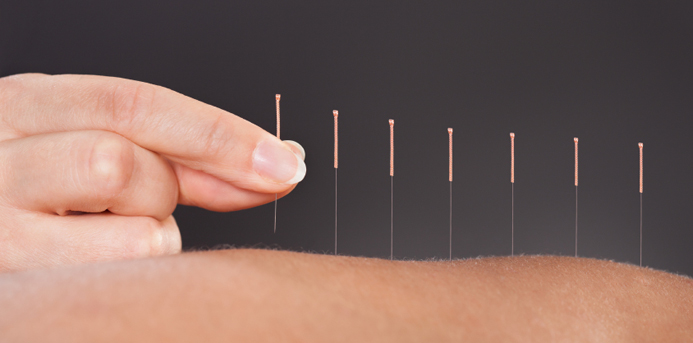Despite the fact that acupuncture is virtually painless, the thought of someone sticking needles into various parts of your body is unnerving for most people. The fact is that acupuncture, while once perceived by many as an “alternative” therapy, is becoming more conventional, to the extent that some insurance companies now even cover it.
Why doesn’t it hurt?
Acupuncture needles are special needles designed to be therapeutic and not painful, explains Dana Hoffman, LAc, Licensed Acupuncturist, MSOM and owner of Lake Shore Acupuncture, with locations in Northfield and Bucktown.
“Most people feel a quick, electrical impulse and then a deep relaxed sensation,” she says. “This is analogous to the zing of eating wasabi with sushi which quickly dissipates. I explain that this electrical sensation is proving that the points run along neurologic pathways.”
To further illustrate how thin acupuncture needles are, Hoffman explains that you can fit 20 acupuncture needles—which are single use, always—onto the head of one hypodermic needle.
Trying acupuncture requires a leap of faith both in terms of the philosophy and the technology, says Michelle Weinberger, Ph.D., a Northwestern University assistant professor and Evanston resident who first tried acupuncture for stress, anxiety, focus and sleeping problems while working on her doctorate.
“In terms of the technology, I watched some videos on the community acupuncture website to see what it was like and was surprised at how relaxed people looked with needles going into them,” she says. “The needles are actually really thin, different from shot needles. You can barely feel them when you go into the skin. In terms of the philosophy, I still don’t quite completely understand why it works, but I feel relaxed and balanced afterwards, which is what really matters.”
So how does it work?
An acupuncture needle facilitates neurotransmitter and hormonal activities—the body’s signaling systems—in the blood vessels and the nerve pathways, says Bonny Rhoads, LAc,board certified acupuncturist, Chinese herbalist, massage therapist and owner of Acupuncture Access in Evanston.
“An acupuncture treatment is like a gentle tap on the shoulder that tells our body to re-balance itself and seek homeostasis immunologically, neurologically and hormonally,” she says. Rhoads adds that another theory is that the gentle mechanical torquing of an acupuncture needle when placed beneath the skin surface may stimulate the body’s fascia system, which is believed to provide whole body intercommunication at a rate faster than the speed of nervous system responses.
“As a culture, we are now in a position to begin to integrate acupuncture into our health care system and discover the breadth and depth of its usefulness and value,” Rhoadssays.
Can I benefit from acupuncture?
Acupuncture is used to treat a wide range of ailments from common complaints to chronic issues.
According to Mark Sobralske, LAc, MSTOM and practitioner/owner at Red Coral Acupuncture in Evanston, it is used to treat a variety of disorders, ranging from musculoskeletal concerns and pain management to chronic internal medicine disorders (such as gastrointestinal diseases, asthma, chronic headaches, obstetrics and gynecological disorders, psycho-emotional concerns, cold and flu symptoms and more).
“Many times patients only come in for one thing, let’s say knee pain, and so we can treat that,” Sobralske says. But oftentimes they do not know that acupuncture is also good for treating other conditions, such as the common cold.
“If there is not a dialogue between patient and practitioner, explaining all the ways that acupuncture can be of use to them, they may not know to come in for a treatment when they get sick in other ways, outside of their chief complaint that they are coming in for initially,” he says.
Evanston resident Megan Otis says that her physician recommended acupuncture for migraine treatment. “I usually experience immediate pain relief from the needles themselves, but I also think there is a huge benefit from the quiet and dark atmosphere,” Otis says. “I have to concentrate on remaining still, so it sort of forces me to slow down and relax.”
“Acupuncture helps the body heal itself by releasing natural painkillers, endorphins and anti-inflammatories,” Hoffman says. “It also sends out neurotransmitters, hormones, and other cellular mediators, which improve circulation and immune functions.”
Hoffman adds that acupuncture will reduce pain and inflammation by circulating more blood to an area and will release endorphins—the body’s natural painkillers—to help ease the pain of arthritis and tendonitis. This reduction in inflammation will enable them to pursue a dual therapy by getting patients back to working out, postural correction, or physical therapy. It would also reduce their recovery time following surgery.
“Acupuncture can and does strengthen the immune system,” Hoffman says. “Many modern diseases involve autoimmune problems; for example, a Type 1 diabetic should respond to acupuncture by needing less insulin over time. This means that the body is using the insulin more effectively as the body is working better.”
“I recommend trying acupuncture as a first resort rather than as a last, and using it for dealing with everyday stress as an introduction to it benefits,” Rhoads says. “One of the things I love about being an acupuncturist is that you can help people with so many different problems: from garden variety knee and back pain, indigestion, stubborn headaches, and women’s health issues to less common problems that conventional medicine may not have quick, easy and inexpensive answers.”

